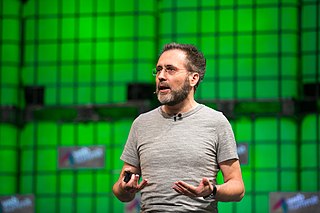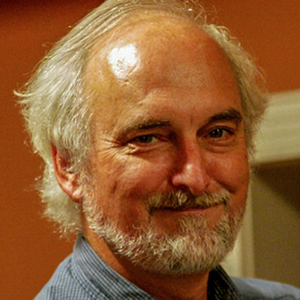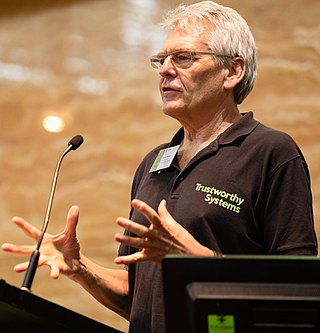Related Research Articles
The Association for Computing Machinery (ACM) is a US-based international learned society for computing. It was founded in 1947 and is the world's largest scientific and educational computing society. The ACM is a non-profit professional membership group, reporting nearly 110,000 student and professional members as of 2022. Its headquarters are in New York City.
Ubiquitous computing is a concept in software engineering, hardware engineering and computer science where computing is made to appear seamlessly anytime and everywhere. In contrast to desktop computing, ubiquitous computing implies use on any device, in any location, and in any format. A user interacts with the computer, which can exist in many different forms, including laptop computers, tablets, smart phones and terminals in everyday objects such as a refrigerator or a pair of glasses. The underlying technologies to support ubiquitous computing include the Internet, advanced middleware, kernels, operating systems, mobile codes, sensors, microprocessors, new I/Os and user interfaces, computer networks, mobile protocols, global navigational systems, and new materials.
A recommender system, or a recommendation system, is a subclass of information filtering system that provides suggestions for items that are most pertinent to a particular user. Recommender systems are particularly useful when an individual needs to choose an item from a potentially overwhelming number of items that a service may offer.
In system administration, orchestration is the automated configuration, coordination, deployment, development, and management of computer systems and software.

Urs Hölzle is a Swiss software engineer and technology executive. As Google's eighth employee and its first VP of Engineering, he has shaped much of Google's development processes and infrastructure, as well as its engineering culture. His most notable contributions include leading the development of fundamental cloud infrastructure such as energy-efficient data centers, distributed compute and storage systems, and software-defined networking. Until July 2023, he was the Senior Vice President of Technical Infrastructure and Google Fellow at Google. In July 2023, he transitioned to being a Google Fellow only.

Timothy Wilking Finin is the Willard and Lillian Hackerman Chair in Engineering and is a Professor of Computer Science and Electrical Engineering at the University of Maryland, Baltimore County (UMBC). His research has focused on the applications of artificial intelligence to problems in information systems and has included contributions to natural language processing, expert systems, the theory and applications of multiagent systems, the semantic web, and mobile computing.

Gernot Heiser is a Scientia Professor and the John Lions Chair for operating systems at UNSW Sydney, where he leads the Trustworthy Systems group (TS).
Matthew Flatt is an American computer scientist and professor at the University of Utah School of Computing in Salt Lake City. He is also the leader of the core development team for the Racket programming language.
Hari Balakrishnan is the Fujitsu Professor of Computer Science and Artificial Intelligence in the Department of Electrical Engineering and Computer Science at MIT, and the Co-founder and CTO at Cambridge Mobile Telematics.
Value sensitive design (VSD) is a theoretically grounded approach to the design of technology that accounts for human values in a principled and comprehensive manner. VSD originated within the field of information systems design and human-computer interaction to address design issues within the fields by emphasizing the ethical values of direct and indirect stakeholders. It was developed by Batya Friedman and Peter Kahn at the University of Washington starting in the late 1980s and early 1990s. Later, in 2019, Batya Friedman and David Hendry wrote a book on this topic called "Value Sensitive Design: Shaping Technology with Moral Imagination". Value Sensitive Design takes human values into account in a well-defined matter throughout the whole process. Designs are developed using an investigation consisting of three phases: conceptual, empirical and technological. These investigations are intended to be iterative, allowing the designer to modify the design continuously.
Subhash Suri is an Indian-American computer scientist, a professor at the University of California, Santa Barbara. He is known for his research in computational geometry, computer networks, and algorithmic game theory.
Margaret Martonosi is an American computer scientist who is currently the Hugh Trumbull Adams '35 Professor of Computer Science at Princeton University. Martonosi is noted for her research in computer architecture and mobile computing with a particular focus on power-efficiency.
Kubernetes is an open-source container orchestration system for automating software deployment, scaling, and management. Originally designed by Google, the project is now maintained by a worldwide community of contributors, and the trademark is held by the Cloud Native Computing Foundation.

Vicki Hanson FACM FRSE FBCS, is an American computer scientist noted for her research on human-computer interaction and accessibility and for her leadership in broadening participation in computing.
Ramesh Govindan is an Indian-American professor of computer science. He is the Northrop Grumman Chair in Engineering and Professor of Computer Science and Electrical Engineering at the University of Southern California.
Arthur Zimek is a professor in data mining, data science and machine learning at the University of Southern Denmark in Odense, Denmark.
Animal–computer interaction (ACI) is a field of research for the design and use of technology with, for and by animals covering different kinds of animals from wildlife, zoo and domesticated animals in different roles. It emerged from, and was heavily influenced by, the discipline of Human–computer interaction (HCI). As the field expanded, it has become increasingly multi-disciplinary, incorporating techniques and research from disciplines such as artificial intelligence (AI), requirements engineering (RE), and veterinary science.
Tawanna Dillahunt is an American computer scientist and information scientist based at the University of Michigan School of Information. She runs the Social Innovations Group, a research group that designs, builds, and enhances technologies to solve real-world problems. Her research has been cited over 4,600 times according to Google Scholar.
Batya Friedman is an American professor in the University of Washington Information School. She is also an adjunct professor in the Paul G. Allen School of Computer Science and Engineering and adjunct professor in the Department of Human-Centered Design and Engineering, where she directs the Value Sensitive Design Research Lab. She received her PhD in learning sciences from the University of California, Berkeley School of Education in 1988, and has an undergraduate degree from Berkeley in computer science and mathematics.

Apache Pinot is a column-oriented, open-source, distributed data store written in Java. Pinot is designed to execute OLAP queries with low latency. It is suited in contexts where fast analytics, such as aggregations, are needed on immutable data, possibly, with real-time data ingestion. The name Pinot comes from the Pinot grape vines that are pressed into liquid that is used to produce a variety of different wines. The founders of the database chose the name as a metaphor for analyzing vast quantities of data from a variety of different file formats or streaming data sources.
References
- ↑ Verma, Abhishek; Pedrosa, Luis; Korupolu, Madhukar; Oppenheimer, David; Tune, Eric; Wilkes, John (2015-04-17). "Large-scale cluster management at Google with Borg". Proceedings of the Tenth European Conference on Computer Systems. EuroSys '15. Bordeaux, France: Association for Computing Machinery. pp. 1–17. doi: 10.1145/2741948.2741964 . ISBN 978-1-4503-3238-5.
- ↑ Tirmazi, Muhammad; Barker, Adam; Deng, Nan; Haque, Md E.; Qin, Zhijing Gene; Hand, Steven; Harchol-Balter, Mor; Wilkes, John (27–30 April 2020). "Borg: The next generation". Proceedings of the Fifteenth European Conference on Computer Systems. EuroSys '20. Heraklion, Yunani: Association for Computing Machinery. pp. 1–14. doi: 10.1145/3342195.3387517 . ISBN 9781450368827.
- ↑ Metz, Cade (2016-04-19). "You Want to Build an Empire Like Google's? This Is Your OS". Wired. ISSN 1059-1028 . Retrieved 2018-12-13.